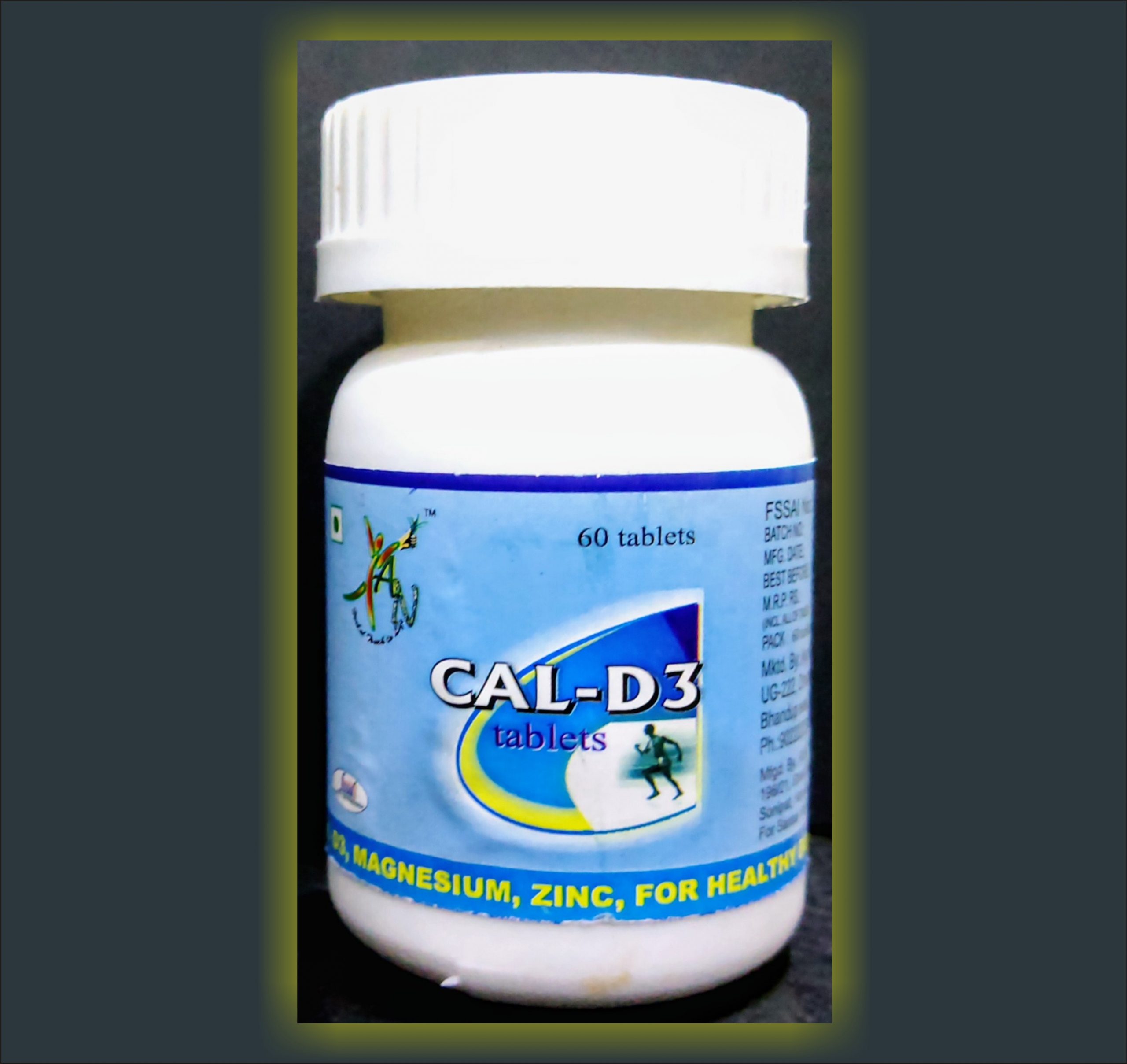Description
B- Fit-CalD3 + tablets: For healthy bones
Nutritional Information : Serving size 2 tablets: Each Serving Contains Approx.: Calcium Citrate Malate 1000 mg, Vitamin D3 200 IU. Zinc 4 mg. Magnesium 100 mg Calcium is essential for normal function of muscles, normal function of the nervous system, and for bone growth and maintenance of bone density. Adequate amounts of calcium will help the bones reach optimum bone density and protect from osteoporosis later in life. Calcium protects your heart. Low calcium levels leads to high blood pressure, overweight, fatigue etc. Vitamin D3 is essential for the efficient utilization of calcium and magnesium by the body & enhances your immunity. It is also useful in Diabetes, Multiple Sclerosis and Rheumatoid Arthritis.
Calcium is needed for your muscles to contract and relax, your nerves to function, and for your blood to clot properly. You store 99 percent of your calcium in our bones. When you need more calcium for your blood, nerves and muscles, your body will remove the calcium from your bones. To keep your bones strong, you need to get enough calcium in your diet. Calcium loss from the bones will add up over time, and that means an increased risk of osteoporosis and bone fractures as you grow older.
Smoking, caffeine consumption, drinking alcohol, heavy protein consumption, exposure to toxic metals, and eating processed junk foods will all increase our need for calcium.
Calcium protects your heart. If you’re low on calcium, researchers say, you’re more likely to have high blood pressure
Research suggests that if you don’t get enough calcium in your diet, you’re likely to be overweight.
The Importance of Calcium for Women
The primary importance of calcium for women is its function in bone development. Young women (adolescents and young adults) need to make sure they get enough calcium, as they can achieve their peak bone mass just after this age. Adequate amounts of calcium will help her bones reach optimum bone density. This can help protect her from osteoporosis later in life. Mature women need calcium to prevent break down of bone. There is also a growing body of research that suggests that calcium may prevent PMS. Women who breast-feed may need to be careful about getting enough calcium to keep their teeth and gums healthy.
Need for Vitamin D3
- Maintains Your Calcium Balance. Maintenance of blood calcium levels within a narrow range is vital for normal functioning of the nervous system, as well as for bone growth, and maintenance of bone density. Vitamin D is essential for the efficient utilization of calcium by the body.
- Aids Your Cell Differentiation. Cellular differentiation results in the specialization of cells for specific functions in your body. In general, differentiation of cells leads to a decrease in proliferation. While cellular proliferation is essential for growth and wound healing, uncontrolled proliferation of cells with certain mutations may lead to diseases like cancer. The active form of vitamin D, inhibits proliferation and stimulates the differentiation of cells.
- Boosts Your Immunity. Active vitamin D is a potent immune system modulator. There is plenty of scientific evidence that vitamin D has several different effects on immune system function that may enhance your immunity and inhibit the development of autoimmunity.
- Has a Role in Insulin Secretion. The active form of vitamin D plays a role in insulin secretion under conditions of increased insulin demand. Limited data in humans suggests that insufficient vitamin D levels may have an adverse effect on insulin secretion and glucose tolerance in type 2 diabetes.
- Blood Pressure Regulation. Adequate vitamin D levels may be important for decreasing the risk of high blood pressure.
According to the National Institutes of Health, vitamin D may play a role in the following diseases:
- Osteoporosis: Osteoporosis is most often associated with inadequate calcium intake. However, a deficiency of vitamin D also contributes to osteoporosis by reducing calcium absorption. Adequate storage levels of vitamin D help keep bones strong and may help prevent osteoporosis in older adults, in those who have difficulty walking and exercising, in post-menopausal women, and in individuals on chronic steroid therapy.
- Cancer: Some preliminary human studies suggest that vitamin D may be protective against some cancers.
- Alzheimer’s disease: With aging, less vitamin D is converted to its active form. One study of women with Alzheimer’s disease found that decreased bone mineral density was associated with a low intake of vitamin D and inadequate sunlight exposure.
- Autoimmune Diseases – Diabetes, Multiple Sclerosis and Rheumatoid Arthritis: Vitamin D intake may decrease the risk of autoimmune diseases. Maintaining sufficient vitamin D levels may help decrease the risk of several diseases as shown above.
- Hypertension (High Blood Pressure): The results of epidemiological and clinical studies suggest an inverse relationship between serum vitamin D levels and blood pressure.
It is quite difficult to get adequate amounts from your diet so for many people, a vitamin D supplement is a practical way to ensure adequate levels of this important protector are always available in your bloodstream.
Since a large body of science shows vitamin D works closely with calcium and magnesium, it is best to take your vitamin D in combination with calcium and magnesium to maintain a proper balance.
Magnesium is useful in soft tissue calcification, muscle cramps, high fat and high sugar intake, nervousness, restlessness, irritability, depression, insomnia, diabetes, high BP, kidney stones, irregular heart beats, palpitations, osteoporosis, asthma, constipation, migraine, Raynaud’s syndrome, neuromuscular transmission including the heart muscles, vasodilatation of blood vessels, inhibitor of platelet, forms tooth enamel making teeth resistant to decay. Magnesium has natural calming effect on the nervous system. It helps keep calcium soluble and prevents formation of kidney stones.
Zinc is an essential mineral that is found in almost every cell in your body. It stimulates the activity of over 100 enzymes. Zinc is one of few minerals that a significant number of people are slightly deficient. Zinc plays an important role in wound healing, brain function, growth and development. Zinc also plays an important role in our immune system. In fact, even moderate deficiencies of Zinc can have an adverse effect on your immune system.
Because zinc plays a role in the development and activation of T-lymphocytes, a type of white blood cell that helps fight infection a severe deficiency of zinc will depress the immune system and leave you at higher risk of infection.
Daily requirement: The amount of calcium that a woman should get per day ranges from 1000mg-1500mg, depending her age group, and hormonal state.
a) Ages 11-24 (adolescents and young adults): 1200-1500 mg
b) Ages 25-50: 1000 mg
c) Pregnant and nursing: 1200-1500 mg
d) Older than 50 (postmenopausal):– on estrogens: 1000 mg — not on estrogens: 1500 mg
e) Older than 65: 1500 mg
For men aged 19 to 50, the general calcium recommendation is 1,000 milligrams (mg) a day. For men older than age 50, the recommendation increases to 1,200 mg a day.
It’s also important to get enough vitamin D, which boosts calcium absorption. The requirement of vitamin D is around 400 to 800 IU per day, for adults and for those above 50 years. The levels are higher between 600 and 800 IU for those above 70 years.
Dosage: 1 tablet twice daily with a glass of water after meals or as directed by physician.










Reviews
There are no reviews yet.